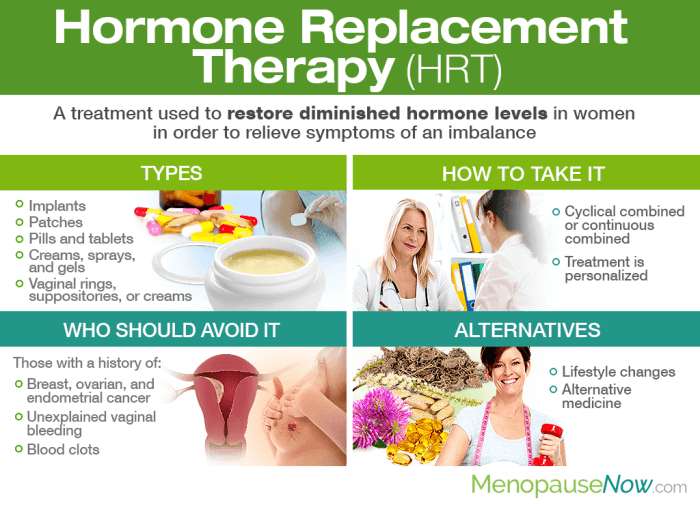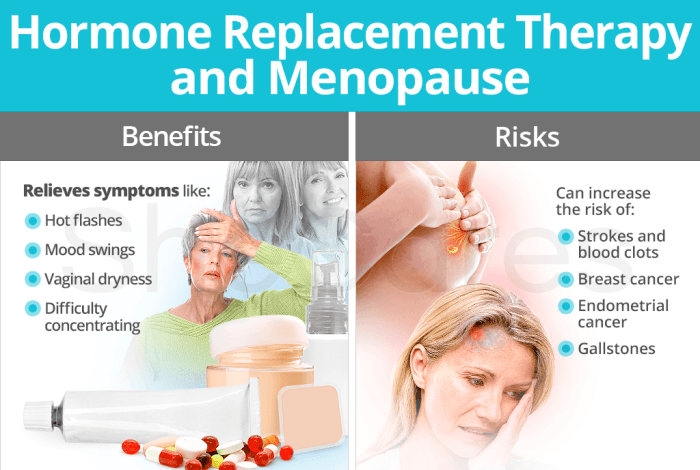As hormone therapy for menopause takes center stage, this opening passage beckons readers with liputan6 author style into a world crafted with good knowledge, ensuring a reading experience that is both absorbing and distinctly original.
Menopause, a natural transition in a woman’s life, can bring about a myriad of symptoms that can significantly impact daily living. Hormone therapy has emerged as a potential solution, offering relief from these symptoms and potentially influencing long-term health outcomes.
Introduction

Menopause, a natural phase in a woman’s life, marks the end of her reproductive years. During this transition, the body undergoes hormonal changes that can lead to a range of symptoms, including hot flashes, night sweats, vaginal dryness, and mood swings.
Hormone therapy, also known as hormone replacement therapy (HRT), has been widely used to alleviate these symptoms and improve women’s overall well-being during menopause.The prevalence of menopause symptoms among women is significant. According to the North American Menopause Society, approximately 75% of women experience at least one menopausal symptom, with hot flashes and night sweats being the most common.
These symptoms can have a substantial impact on women’s daily lives, affecting their sleep, mood, and overall quality of life.
Types of Hormone Therapy
Hormone therapy for menopause involves the use of hormones to relieve symptoms and prevent health problems associated with the decline in estrogen levels during menopause. There are different types of hormone therapy available, each with its own benefits and risks.
Estrogen-only Therapy
Estrogen-only therapy involves taking estrogen alone. It is typically used for women who have had a hysterectomy (removal of the uterus) to prevent endometrial cancer. Estrogen-only therapy can help relieve hot flashes, night sweats, and other menopausal symptoms. However, it can increase the risk of blood clots, stroke, and breast cancer.
Progestin-only Therapy
Progestin-only therapy involves taking a synthetic hormone called progestin alone. It is typically used for women who still have their uterus to prevent endometrial cancer. Progestin-only therapy can help relieve hot flashes and night sweats, but it may not be as effective as estrogen-only therapy.
It can also cause irregular bleeding and weight gain.
Combined Therapy
Combined therapy involves taking both estrogen and progestin. It is typically used for women who still have their uterus to prevent endometrial cancer and relieve menopausal symptoms. Combined therapy can be more effective than estrogen-only therapy in relieving hot flashes and night sweats.
However, it can also increase the risk of blood clots, stroke, and breast cancer.
Risks of Hormone Therapy
Hormone therapy is generally safe and effective, but it does carry some potential risks. The most common side effects are hot flashes, night sweats, and vaginal dryness. However, there are also some more serious risks, including:
- Increased risk of breast cancer:Hormone therapy can increase the risk of breast cancer, especially in women who take it for more than five years.
- Increased risk of heart disease:Hormone therapy can increase the risk of heart disease, especially in women who have other risk factors, such as high blood pressure or high cholesterol.
- Increased risk of stroke:Hormone therapy can increase the risk of stroke, especially in women who have other risk factors, such as high blood pressure or diabetes.
The risk of these side effects depends on a number of factors, including the type of hormone therapy you take, the dose, and how long you take it. Your doctor can help you weigh the risks and benefits of hormone therapy and decide if it is right for you.
Factors That May Increase or Decrease the Risk of Side Effects
- Age:The risk of side effects is higher in older women.
- Overall health:Women who are overweight or obese, have high blood pressure, or have a history of heart disease or stroke are at higher risk of side effects.
- Type of hormone therapy:The risk of side effects is higher with estrogen-only therapy than with estrogen-progestin therapy.
- Dose:The risk of side effects is higher with higher doses of hormone therapy.
- Duration of use:The risk of side effects is higher with longer use of hormone therapy.
If you are considering hormone therapy, it is important to talk to your doctor about the risks and benefits so you can make an informed decision.
Eligibility and Considerations

Hormone therapy is generally recommended for women who are experiencing moderate to severe menopausal symptoms that significantly impact their quality of life. Eligibility for hormone therapy is determined by several factors, including age, health history, and lifestyle.
Age is a significant consideration for hormone therapy eligibility. Hormone therapy is typically not recommended for women under the age of 50 or those who have not yet reached menopause. This is because the risks of hormone therapy, such as blood clots and breast cancer, increase with age.
Health history is another important factor to consider when making a decision about hormone therapy. Women with a history of certain medical conditions, such as heart disease, stroke, or breast cancer, may not be eligible for hormone therapy. This is because hormone therapy can increase the risk of these conditions.
Lifestyle factors, such as smoking and obesity, can also affect eligibility for hormone therapy. Women who smoke or are obese may be at an increased risk of side effects from hormone therapy.
It is important to discuss the risks and benefits of hormone therapy with a doctor before making a decision about whether or not to take it.
Factors to Consider
- Age
- Health history
- Lifestyle factors
Other factors that may be considered include:
- Severity of menopausal symptoms
- Personal preferences
- Availability of other treatment options
Alternatives to Hormone Therapy
Hormone therapy is not the only option for managing menopausal symptoms. Several alternative treatments can provide relief, including lifestyle changes, diet, exercise, and complementary therapies.
These alternatives offer potential benefits and limitations. It’s important to discuss the options with a healthcare provider to determine the best approach for individual needs.
Lifestyle Changes
Simple lifestyle modifications can significantly improve menopausal symptoms. These include:
- Maintaining a healthy weight:Excess weight can worsen hot flashes and other symptoms.
- Regular exercise:Exercise helps regulate body temperature, reduce stress, and improve sleep.
- Avoiding triggers:Certain foods, such as caffeine and alcohol, can trigger hot flashes. Identifying and avoiding these triggers can help.
- Getting enough sleep:Sleep deprivation can exacerbate menopausal symptoms. Aim for 7-9 hours of quality sleep each night.
Diet, Hormone therapy for menopause
Dietary changes can also alleviate menopausal symptoms. Some beneficial dietary recommendations include:
- Increasing soy intake:Soy contains isoflavones, which have estrogen-like effects and may reduce hot flashes.
- Eating plenty of fruits and vegetables:Antioxidants in fruits and vegetables help protect against oxidative stress, which can contribute to menopausal symptoms.
- Limiting processed foods:Processed foods are often high in sugar and unhealthy fats, which can worsen symptoms.
- Staying hydrated:Dehydration can trigger hot flashes. Drink plenty of water throughout the day.
Exercise
Regular exercise offers numerous benefits for menopausal women. It helps:
- Reduce hot flashes:Exercise increases endorphin levels, which have mood-boosting and pain-relieving effects.
- Improve sleep:Exercise promotes relaxation and improves sleep quality.
- Strengthen bones:Exercise helps maintain bone density, which is important for preventing osteoporosis.
- Manage weight:Exercise helps burn calories and maintain a healthy weight, which can reduce menopausal symptoms.
Complementary Therapies
Complementary therapies, such as acupuncture, herbal remedies, and meditation, may provide additional relief for menopausal symptoms. However, it’s important to note that these therapies have varying levels of scientific evidence supporting their effectiveness.
- Acupuncture:Acupuncture involves inserting thin needles into specific points on the body. It may help reduce hot flashes and improve sleep.
- Herbal remedies:Certain herbs, such as black cohosh and red clover, have been traditionally used to treat menopausal symptoms. However, their effectiveness and safety have not been fully established.
- Meditation:Meditation techniques, such as mindfulness and yoga, can help manage stress and improve overall well-being, which may alleviate menopausal symptoms.
It’s important to consult with a healthcare provider before using any alternative treatments for menopausal symptoms. Some therapies may interact with medications or have other potential side effects.
Monitoring and Follow-Up
Regular monitoring and follow-up care are crucial during hormone therapy to ensure its effectiveness and safety. These visits allow healthcare providers to assess the patient’s response to therapy, monitor for any side effects, and make necessary adjustments to the treatment plan.
During follow-up appointments, healthcare providers may conduct various tests and procedures to monitor the therapy’s progress and address any concerns. These may include:
Physical Examination
- A physical examination to check for any physical changes or symptoms that may be related to hormone therapy.
Blood Tests
- Blood tests to measure hormone levels, assess liver function, and monitor cholesterol levels.
Mammograms
- Mammograms to screen for breast cancer, which is a potential risk associated with hormone therapy.
Bone Density Scans
- Bone density scans to monitor bone health and prevent osteoporosis, another potential risk associated with hormone therapy.
Lifestyle Assessment
- A lifestyle assessment to discuss any changes in diet, exercise, or other lifestyle factors that may affect the effectiveness or safety of hormone therapy.
Conclusion

In summary, hormone therapy for menopause can provide relief from bothersome symptoms and improve overall well-being. However, it is essential to consider the potential risks and benefits carefully and make an informed decision based on individual circumstances.
Healthcare providers play a crucial role in guiding patients through this process. They can provide personalized recommendations, monitor progress, and adjust treatment as needed. By working together, patients and their healthcare providers can determine whether hormone therapy is the right choice for managing menopausal symptoms.
End of Discussion: Hormone Therapy For Menopause
Navigating hormone therapy for menopause requires a delicate balance of understanding the potential benefits and risks, coupled with personalized decision-making guided by healthcare providers. This exploration has shed light on the complexities surrounding this topic, empowering individuals to make informed choices that align with their unique circumstances.
Helpful Answers
What are the common symptoms of menopause?
Menopause can bring about a range of symptoms, including hot flashes, night sweats, vaginal dryness, mood swings, and sleep disturbances.
What types of hormone therapy are available?
Hormone therapy options include estrogen-only therapy, progestin-only therapy, and combined therapy, each with its own benefits and risks.
What are the potential benefits of hormone therapy?
Hormone therapy can effectively alleviate menopausal symptoms, improve bone density, and potentially reduce the risk of certain chronic diseases.
What are the potential risks of hormone therapy?
Hormone therapy carries potential risks, including increased risk of breast cancer, heart disease, and stroke, although the risks vary depending on individual factors.
Who is eligible for hormone therapy?
Eligibility for hormone therapy is determined based on factors such as age, health history, and menopausal symptoms.